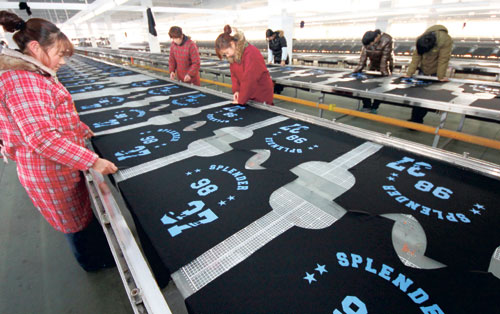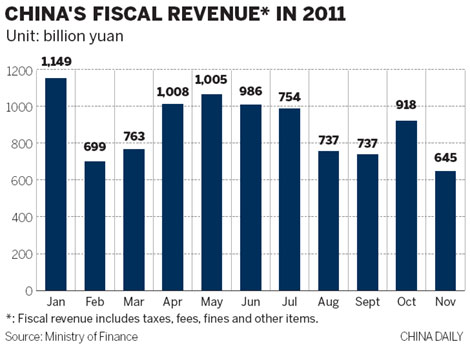Government set to act as export expansion slides
Updated: 2011-12-14 09:26
By Ding Qingfen (China Daily)
|
|||||||||
BEIJING - With China's export growth continually decelerating and possibly falling to zero next year, the government is set to take action to prevent further declines, said the Ministry of Commerce on Monday.
|
 |
|
Workers in a factory in Shandong province print clothes for export. If world conditions worsen next year, China will take measures to make its exports more stable, according to a senior official.[Photo/China Daily] |
These measures include supporting exporters' drive to tap emerging markets, approving the establishment of 59 export bases, strengthening traditional industries and helping exporters in the central and western regions expand overseas.
Conditions next year "will be more complicated and severe for Chinese exporters, and the task for the Chinese government in maintaining stable export growth will be harder" said Zhong Shan, vice-minister of commerce, during a foreign trade meeting in Beijing.
His remarks came after the General Administration of Customs released November trade figures on Saturday. Export growth continued to decelerate, the figures show, and overseas sales were up just 13.8 percent year-on-year, the smallest gain since 2009.
"Several difficulties and uncertainties do and will exist, and we will have measures in place to stabilize exports as noted in China's 12th Five-Year Plan covering the 2011-2015 period," Zhong said.
Export growth is expected to "drop to zero in 2012", and that will have a "sizeable negative impact on the economy", said Wang Tao, economist at the Hong Kong-based UBS Securities Co Ltd, in a note.
The predication came as top Chinese officials are mapping out economic policies for 2012 at an ongoing three-day annual Central Economic Work Conference in Beijing.
According to Zhong, one large step that the government will take is to do more to help exporters develop and promote goods and services in emerging markets, especially those with large populations and rich natural resources.
Statistics show that although emerging markets have made a much smaller contribution to Chinese exports than developed nations, their economies' growth is faster.
In 2010, 36 percent of China's outbound shipments went to four markets: the United States, the European Union, South Korea and Hong Kong.
But four emerging markets - Russia, Brazil, South Africa and India - accounted for a mere 7 percent of overseas sales, even though their economies showed faster growth than developed regions'.
Export bases
China on Tuesday approved and announced the establishment of 59 export bases to help maintain growth in overseas shipments. These include a garment exports base in East China's Jiangsu province, an apple base in Shaanxi province and a shoe base in Zhejiang province.
They were the first group of exports bases officially approved. The idea is for important industrial participants to gather and work on improving their goods and services for export, investing more in research and development and become better competitors.
The bases are generally located in a region or city that either has a strong industry chain for a specific sector or has abundant resources of some specific goods.
Sources speaking on condition of anonymity said that the government will give "handsome subsidies" to the exporters involved.
"Such bases make it easier to strengthen industrial chains and promote brands in different regions," Zhong said. "And it is also more efficient for global purchasers."
Wang said that the export figures underline "shifts in the export structure - some traditional lower-end and labor-intensive sectors may be losing market share to cheaper producers."












